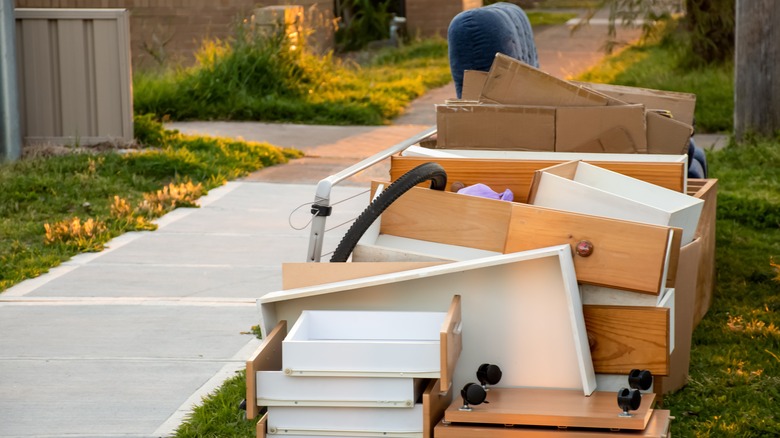Tips For Getting Along With Difficult Neighbors
You've just moved into your dream house, but it comes with additional baggage: bad neighbors. Living next to people we don't get along with can cause major stress in our lives. In fact, according to Australian National University, a positive community is essential to our mental health. "Neighborhood cohesiveness is a really important social glue; it keeps us connected and supports our wellbeing in everyday life and during a crisis. Everybody needs good neighbors. It is good for your health," said Dr James O'Donnell. So, if you are living with people who are causing a crisis instead, it's normal to feel a little bit trapped.
If you are currently living next to difficult neighbors, it is likely that you are at the end of your rope. But don't give up and think about moving to a new house just yet. Instead, consider the ways you can work through your problems and get back to a more peaceful kind of living. Remember, you don't have to become best friends with your bad neighbors, or even meet them in the middle if you don't want to. All you need to do is come up with a plan to feel comfortable and happy in your own home. If you're ready, here is what to do.
1. Establish a positive relationship from the beginning
If you know someone personally, it can be easier to address difficult topics as they arise. So, the best way to get along with your neighbors is to go out of your way to establish a relationship with them from the beginning. This could be when you arrive at your new home, or when they move in — it all depends on who gets there first.
The most traditional way to greet new arrivals to the neighborhood used to be going over with a casserole or tray of cookies when you saw a moving truck out front. However, according to Pendragon Homes, there are now plenty of more subtle ways to connect with those who live around you. The first is simply to be approachable when out and about. For example, exchange a smile with dog owners on their daily walks, as there is no better way into someone's good graces than through their pets. You can also compliment your neighbor's yard when you see them spending the entire weekend out in the garden. Don't be afraid to join in community events, like Christmas light displays, summer BBQs, etc. This way, if there is a conflict, you can resolve things among friends rather than with strangers.
2. Try to consider things from their point of view
When our neighbors accuse us of creating a problem that is impacting their quality of life, it can be distressing. Our natural instinct might be to go on the defensive and insist that it's actually them in the wrong. However, this approach often only creates more conflict. Instead, if things are heating up between a neighbor and yourself, take a step back and really try to look at things from their point of view. It is possible that you're doing something disruptive — even if it's unintentional — so don't be too defensive.
Is your large tree really dropping acorns into their pool? Then grab your tree trimmers or schedule a trimming service in the next week or so. Is your barking dog disturbing their work meetings? Consider a doggy daycare a few times per week, or work on training your dog. If you struggle to see where you might be in the wrong, don't worry. It's a skill you can learn. According to the Harvard Business Review, you can understand a person's frustration if you better understand their desired solution. For example, they want to swim in their pool without it being clogged up with debris from your tree. While you might not appreciate the way they brought it up to you, the key is to focus on the solution instead. You can definitely relate to wanting to enjoy your home free from a mess you didn't create.
3. Be willing to let a few things slide
If you have neighbors that live life a little differently than you do, problems could potentially pop up. Sometimes they might have a large party that keeps you awake until well past midnight, or redo their kitchen — causing lots of racket and dust. These are definitely annoying situations, but before you decide to escalate things, take a moment to consider the context of the situation.
According to Clayton Utz, sometimes the best course of action is no action at all. If something is a one-off situation, it might be more beneficial to just let it slide. And remember, you might need a little bit of grace one day, too. However, if things are ongoing and they are bothering you, the key to preventing a messy escalation is to address things very early and very casually. If you have your neighbor's number, it could be worth sending a quick text about the noise from the party around 11 p.m., instead of waiting until 2 a.m. to call the police with a noise complaint. One solution is a small matter between neighbors, the other is a serious escalation which can break down trust and build bad feelings.
4. Be careful of the place where you address things
Sometimes, coming to someone's front door unannounced can make them feel defensive, especially when they have never spoken to you before. Think about it: if you are at home enjoying some music and your neighbor starts banging on your door to yell at you, how would you react? This is why building relationships early is important. A casual text message lacks intimidating physical presence, which is why it can be better than simply showing up unannounced. If you don't have your neighbor's number, a quick note works, too. However, remember to be polite! It won't help your cause if your neighbors feel they're under attack.
According to Mediate.com, if you plan to meet in person to talk about your grievances, the physical location of the conversation can really impact its outcome. Both parties present must feel comfortable and in control during the meeting. If someone is feeling unsafe, or even like the other person has the upper hand, it can impact the kind of choices that they make. To keep things neutral, consider letting your neighbor pick the location and you pick the time, or vice versa. This way, everyone feels like they have a little bit of control. Consider places like a coffee shop or local park.
5. Seek support from other neighbors
When it comes to difficult neighbors, it's pretty common that they have more than one victim. If you are currently experiencing an issue with someone living nearby, you might not be the only one in the area facing the problem. Because of this, it's possible someone else has a solution already, too. To save yourself the hassle of reinventing the wheel, take the time to seek out support from your community instead of going through the problem alone.
According to Make Tech Easier, there are a number of apps you can download to connect with those living around you. The most popular of these apps is Nextdoor, which ensures that everyone using the app in a specific area has had their addresses verified. Other apps include Mycoop, Olio, and ioby. You might try downloading multiple apps to see which is the most active in your area. Also, consider joining local Facebook groups and seeking out your neighborhood's other social media presences.
6. Review your local ordinances and HOA bylaws
It's important to know the legality of a situation before you act. If you are in a dispute with your neighbors, you cannot always rely on common sense to correct their behavior. In some cases, people will only follow the letter of the law instead of social norms. An example of this would be blasting music at 8 a.m. on a Saturday morning when the noise ordinance expires at 7 a.m. While not against any local rules and certainly not illegal, this can still be disruptive and rude behavior. In this instance, your only recourse would be to ask nicely, as you have no rules or legislation to fall back on.
However, before speaking to your neighbor, it's always a good idea to know the facts. If you are aware of who is technically in the right, you can decide whether to escalate the situation. According to the Harvard Kennedy School, it's hard to run a comprehensive search of all state and local databases at once. To find the information you need, you might need to check each website individually. That would be your Homeowner's Association (HOA) website, your city website, your county website, and your state website.
7. Know the right way to escalate a situation
Calling the authorities isn't always the best course of action for non-emergency situations. For example, you wouldn't call 911 if your neighbor's dog keeps using the bathroom in your yard, but you would if the dog attacks your child and you need help. When dealing with difficult neighbors, consider the appropriate escalation process for each complaint.
According to the City of Katy, you would call animal control if you see a roaming dog, or are witnessing animal cruelty occur. This department specializes in animals and can give better advice than the police that typically focus on human conflicts for resolving the situation. However, if your neighbor keeps sneaking into your backyard to use your pool, you can absolutely call the police if you have already spoken to them about not doing this (via Campion, Curran, Lamb & Cunabaugh). They are trespassing and putting you at substantial risk of a lawsuit should anything happen to them while using your pool.
8. Document everything that occurs surrounding the problem
The tricky thing about getting along with difficult neighbors is that, in most cases, it might just come down to their word against yours. Let's say your neighbor has been shooting squirrels with a BB gun in your yard, putting your family and pets at risk of injury. If you call the police and inform them of this, your neighbor could simply say, "No, I didn't do that and my neighbor is just lying because they don't like me." If you don't have evidence, the case might be dropped.
According to the Houston Chronicle, when two employees are in a dispute, keeping a record of everything ensures a better outcome. The same could be said of problems between neighbors. So, if something bad is happening, make sure you have proof of it. Take audio recordings of loud parties. Take photos of the trash your neighbor dumped on your curb. When you speak to your neighbor about an issue, keep notes of what was said and when it happened. You might even want to email it to yourself so it is timestamped.
9. Install a video camera on your property
If your neighbors are hostile towards you, or you suspect criminal activity on their part, it is especially important to install a video camera on your property. This way, you can have records of the conflict even if you are not home, or are not able to actively document it. Luckily, these days it is very easy and inexpensive to purchase home security systems. If you are feeling unsafe, all it takes is a quick trip to the local hardware store (or a few clicks on Amazon), and an afternoon — if even that — of set up work.
According to Tom's Guide, there are cameras that work inside and outside of your home. For example, you can purchase a video doorbell, like one from the popular brand Ring, to keep an eye on things on your front porch. These doorbells send motion and audio alerts to your phone and allow you to speak through the device, too. If you want to know what's going on inside your home, you can also use an internal camera from a brand like Google or Nest. This way, if anything happens inside your home, you'll also know.
10. Consider taking a course in negotiation
When you are working with your neighbor to solve a dispute that isn't covered by local laws, you might feel like you are talking to a brick wall. When you don't have enforceable rules to fall back on, reaching a solution might seem impossible. This is because getting what you want out of a tense situation isn't a skill that comes naturally to most of us. If you find yourself feeling unsure of what to say when asking your neighbor to stop troublesome behavior, you might consider taking a course in negotiation.
According to Shapiro Negotiations Institute, taking a class in negotiation can help you in business settings, as well as in personal ones. You can learn how to listen for key phrases in someone's words, so you can understand what it is that they truly want. From there, you can ask better questions to make the other person feel understood. Often, those in negotiations want the same solution, but just have different ideas on how they want to get there. By taking a course, it will be easier for you to convince your neighbor (in a polite, professional manner) to do things your way.
11. Order a professional survey of your property
If your neighbor is encroaching on your land, it can be a good idea to know once and for all who owns what. Problems around property boundaries often come up when a neighbor wants to do a construction project. This could be something smaller, like putting up a shed or building a fence, or something a bit bigger, like installing an in-ground pool. When we buy a house, we are often told exactly where the property lines are, but over time, we might forget. Sometimes, people get a wrong idea in their head about a certain landmark being the boundary and, over the years, it transforms into a fact for them. Therefore, when they start their project, they are operating on what they think is true, instead of the legal truth.
To avoid a dispute, the simple solution for any problems around the property lines is to order a survey. According to Quicken Loans, if you want your home professionally surveyed, all you have to do is hire a professional land surveyor. They will tell you exactly where your land starts and ends, as well as any easements on the property. (An easement is a shared space that others can access, like power lines, etc.) If you have a recent survey, you can then either stop your neighbor building on your land, or build whatever you want on yours.
12. Offer to go above and beyond towards a solution
Sometimes, the best way to deal with difficult neighbors is simply to allow them to win. This can be hard for most of us to admit, especially if our neighbors are really doing the wrong thing. However, swallowing our pride might just be the only way to reach a solution. For example, according to Pacific Fence, fencing costs should be shared between neighbors if the fence falls along the property line. If one neighbor doesn't cooperate, the other neighbor can technically build the fence on their own and sue for the remaining portion of the costs.
With that said, take a moment and pause to think about the escalation of that process. If you sue the person living right next door to you, it's likely they will become hostile and other problems could arise. You will also need to consider the time, effort, and other costs of court — even if it is a small claims situation. Now compare that to the costs of simply paying for the fence on your own. With some problems, offering more than your fair share towards the solution can really move things along and keep things friendly.












